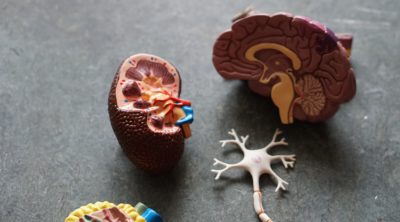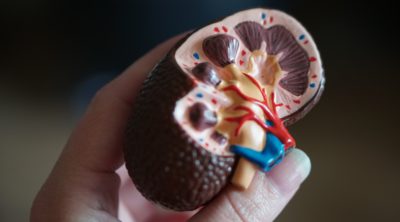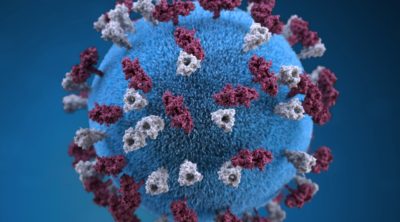
Glands in the human body produce, control and regulate the flow of hormones, breast milk, saliva, and other useful fluids. Mental stress influences the flow of hormones and other fluids as well. This article explains the significance of glands in metabolism, growth, and reproduction.
Glands in the body release fluids or hormones that play an important role in maintaining the health of the body. Glands are classified as ducted and ductless glands. Ducted glands, also called exocrine glands, secrete some chemicals through ducts. Ductless glands are called endocrine glands. Glands receive signals from the brain to release useful fluids. Endocrine glands release hormones directly into the bloodstream. Hormones are the chemical messengers which facilitate the communication between the brain and the organs. As the nervous system uses nerves to send the required information, the glands in the human body use blood vessels as information channels. Here’s an overview of the endocrine system.
Endocrine or Ductless Glands of the Human Body
Pituitary Gland
The pituitary gland, located at the base of the skull, is known as the ‘master gland’. It controls the functions of other ductless glands. This tiny, pea-shaped gland is one of the most important parts of our body. It is divided into anterior and posterior pituitary.
This gland influences metabolism, reproduction and growth by releasing hormones like prolactin, thyroid stimulating hormone, adrenocorticotropic hormone, growth hormone, oxytocin, luteinizing hormone, follicle-stimulating hormone, etc.
Adrenal Glands
The adrenal glands look like triangular hats placed on the top of the kidneys. The length of an adrenal gland is about one or two inches and it weighs only a fraction of an ounce. Though small in size, these glands secrete almost three dozen hormones! The main functions of adrenal glands include carrying out the metabolic processes and helping the body deal with stress.
These glands regulate the ‘fight or flight mechanism’ of the body. Adrenal medulla releases adrenaline and noradrenaline while the adrenal cortex releases cortisol, corticosterone, cortisone, and aldosterone (which determines salt-water balance in the body).
Thyroid Gland
Thyroid gland, located in the neck, looks like a butterfly. It weighs less than an ounce. Situated below our voice box, thyroid’s main function is to regulate body metabolism. Functions of the body are severely affected when thyroid does not work well. Overactive or under active thyroid gland leads to several health problems.
Hormones secreted by the thyroid play an important role in generation of heat and energy, protein synthesis, vitamins, protein, fat, and carbohydrate metabolism, release and functions of other hormones, increased sensitivity of the body to other hormones like adrenaline, etc. Thyroid hormones (T3 and T34) are produced with the help of iodine and tyrosine. Therefore experts recommend incorporation of iodized salt in regular diet.
Parathyroid Glands
Human beings have four parathyroid glands. They are as small as a grain of rice and are located on the posterior surface of the thyroid gland. These glands control the level of calcium in our blood and bones. They regulate the growth of muscles and bones by determining the distribution of calcium and phosphate in the body.
These glands also govern the function of the nervous and muscular system. Parathyroid hormone (PTH) activates vitamin D and enhances the absorption of calcium in the gastrointestinal tract. Low PTH levels lead to fatigue and anxiety.
Hypothalamus
Hypothalamus (part of the brain) is known as the ‘control and relay center of the endocrine system’. The autonomic nervous system is governed by the hypothalamus. It plays an important role in certain metabolic processes. Located near the pituitary gland at the basal part of the skull (above the brain stem), it controls pituitary secretions.
All the automatically adjusted factors such as hunger, thirst, sleep, emotional behavior such as anger and sexual activity, body temperature, blood pressure, function of the cardiovascular system (heart rate), and abdominal visceral regulation are controlled by the hypothalamus. As we grow older, hypothalamus requires support to maintain optimum level of performance. Dysfunction of the hypothalamus results in depression or abnormal responses to stress.
It also leads to disturbances in the brain. Hormones released by the hypothalamus stimulate the release of other hormones like thyrotropin, prolactin, gonadotropin, corticotropin, growth hormone, etc. and inhibit the production of prolactin (by releasing dopamine), growth hormone (by releasing somatostatin), etc. The hormone oxytocin plays an important role in uterine contractions and lactation. The antidiuretic hormone vasopressin is also secreted by the hypothalamus.
Prostate
Prostate is a chestnut-sized gland, which plays an important role in the male reproductive system. It encircles the urethra below the bladder. It secretes an alkaline fluid which contains semen with spermatozoa and seminal vesicle fluid that is expelled during ejaculation. Thus it determines the fertility quotient of a man.
Prostate helps regulate blood pressure too. When an enlarged prostate creates pressure on the urethra and bladder, the man suffers from problems like difficulty in urination.
Gonads
Gonads are the reproductive glands – ovaries in women and testicles in men. They produce germ cells known as gametes. They release sex hormones. The almond-shaped ovaries are present on either side of the uterus. They produce ova or eggs. Important hormones, like estrogen and progesterone are secreted by them.
The testicles are hidden in the scrotum and are responsible for the production of sperms in males. They release the hormone testosterone. They have a built-in thermostat to keep the sperms at the correct temperature. Thus, these glands play an important role in fertilization and reproduction. They determine the male/female characters (like development of body/facial hair) of a person.
Thymus
The thymus, situated in the middle of the chest, beneath the upper part of the breastbone near the heart, is a pyramid-shaped small gland. It builds resistance for combating diseases and helps in one’s physical development.
The size of the thymus grows during the neonatal and pre-adolescent periods. It is most active in the early years after birth. It plays an important role in the functioning of the immune system. As the body reaches puberty, it starts shrinking. In adults, it is difficult to identify thymus.
Pancreas
The pancreas, located behind the stomach, is yellowish in color. It is about 7.5 inches long and 1.5 inches wide. It is connected to the small intestine. Certain cells in the pancreas secrete digestive enzymes, which play an important role in the digestion of proteins, carbohydrates, and fats. Important hormones – insulin and glucagon are secreted into the blood stream by the pancreas.
Thus pancreas works as an endocrine as well as exocrine gland. As we all know, insulin helps lower the blood sugar level. But if glucose level is found to be too low, glucagon helps increase it. Malfunctioning of insulin-generating cells results in diabetes. Pancreas helps neutralize the chyme. (Chyme is the partly digested food. It is in the form of thick semi-fluid when it passes through the stomach.)
Pineal Gland
The pineal gland is located within the brain. It is safely positioned in the groove at the center of the brain, between the two hemispheres. It releases melatonin which supervises the biological clock of the body. It controls our walking and sleeping patterns.
Sexual development is also controlled by the pineal gland. Melatonin helps avoid and get over jet-lags. In the ancient times, the pineal gland was considered as the third eye, with supposed magical powers.
Exocrine or Ducted Glands of The Human Body
Lachrymal Glands
Tears are produced by the lachrymal glands. They are found in the eye cavities. Their function of producing tears is controlled by the nervous system. They help lubricate the eyes.
Sweat Glands
Sweat is the salty fluid secreted by the sweat glands. Sweat accumulates in the small glands located under the skin and it evaporates when the body experiences excessive heat. Thus, these glands help maintain the body temperature.
Salivary Glands
Salivary glands are located in and around the mouth and the throat. Saliva from salivary glands initiates the process of digestion. It helps moisten the mouth and prevents tooth decay. Malfunctioning of these glands causes dehydration.
Mammary Glands
Mammary glands exist in both sexes. But, the hormones released by the ovaries stimulate the growth of the mammary glands in females, at the onset of puberty. After the birth of a child, the milk from the mammary glands nourishes the baby. Various hormones determine the production and flow of breast milk.
Sebaceous Glands
Sebaceous glands lie under the skin. They secrete sebum. This fatty substance forms a water-repellent layer on the skin. It protects the skin and makes it supple. Sometimes, due to the presence of dust particles in the atmosphere, the pores on the skin get blocked. Obstruction in the path of the sebum
leads to the formation of blackheads. Blackheads are the root cause of acne.
Diseases Caused due to Functional Failure of Glands
Osteoporosis, diabetes, renal failure, multinodular goiter, hyper/hypothyroidism, polycystic ovaries and cancer are some of the diseases caused due to the failure of the glands in the human body.
Dwarfism, gigantism, outburst of acne, infertility, miscarriage, skin disorders, early/late puberty and excessive weight are some of the effects of hormonal imbalance in the body. The malfunctioning of one or more glands in the body can lead to mental disturbances, mood swings, depression and high/low blood pressure.
Balanced diet, various therapies like massage, shiatsu, aroma therapy, acupuncture, and regular exercise promote proper functioning of glands. Doctors may prescribe medications to improve the functions of the glands. In extreme cases, surgery is performed to remove a damaged gland. After the removal of the entire gland, hormone replacement therapy is usually recommended.
‘Chakra’, the Sanskrit word, means ‘wheel’ or ‘turning’. Body ‘chakras’ refer to the important centers on our body. They are considered as the focal points of the human body which receive and transmit energies. There are seven major ‘chakras’ according to the ‘Indian Upanishadas’. It is interesting to find that the locations of the endocrine glands in the human body correspond with the locations of these ‘chakras’.
The activation of these ‘chakras’ helps gain control over the functioning of glands and achieve peace of mind. Yoga and meditation help gain control over these glands. You can lead a peaceful life by learning stress management techniques. Stress leads to dysfunction of glands resulting in harmful diseases and disorders.
The functions of the endocrine and the exocrine systems are of extreme importance to the body. Proper functioning of the glands helps maintain weight, blood pressure, blood sugar levels, electrolyte balance, body temperature, heart rate, bone density, etc. With simple measures like healthy diet and regular exercise, you can maintain the health of the glands.
Disclaimer: The article above is purely for the purposes of imparting information and is not to be substituted for any doctor/expert advice.






















